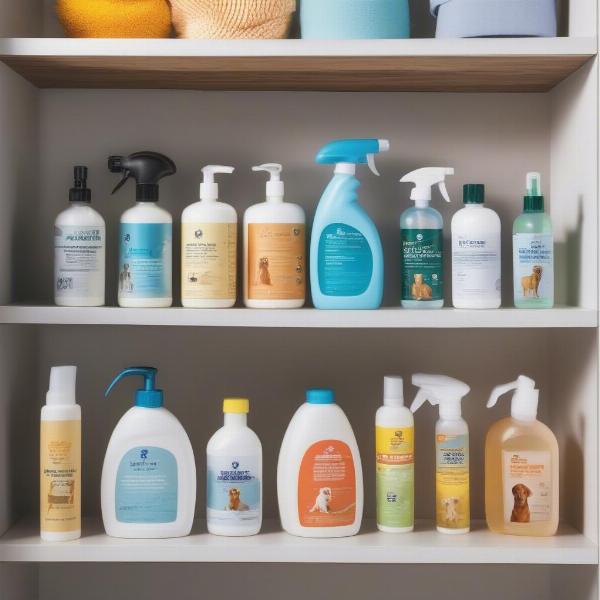The search term “dog vodka” might raise some eyebrows. While it might seem like a quirky topic, it’s crucial to address the serious underlying concern: the absolute necessity of keeping alcohol away from your dog. Alcohol is toxic to dogs and can cause severe health problems, even death. This article will delve into the dangers of alcohol for dogs, explain why it’s so harmful, and offer practical tips on preventing accidental ingestion.
Why is Alcohol Dangerous for Dogs?
Alcohol affects dogs much more severely than humans due to their smaller size and different metabolism. Even a small amount of alcohol can be toxic. Their bodies can’t process alcohol efficiently, leading to a rapid buildup of toxic substances in their system. This can cause a range of symptoms, from mild intoxication to life-threatening conditions.
Common Signs of Alcohol Poisoning in Dogs
- Vomiting
- Diarrhea
- Weakness
- Difficulty breathing
- Tremors
- Seizures
- Coma
If your dog exhibits any of these symptoms after potential alcohol exposure, seek immediate veterinary care. Time is of the essence in treating alcohol poisoning.
How to Prevent Alcohol Exposure in Dogs
Preventing alcohol exposure is the best way to protect your dog. Here are some essential precautions:
- Keep alcoholic beverages out of reach: Store all alcoholic drinks, including beer, wine, and spirits, in secure cabinets or high shelves.
- Be mindful of spills: Clean up spilled alcohol immediately and thoroughly. Even small puddles can be dangerous if licked up by a curious canine.
- Educate guests: Inform visitors about the dangers of alcohol for dogs and ask them to be cautious with their drinks.
- Avoid using alcohol-based products around your dog: Some cleaning products, hand sanitizers, and perfumes contain alcohol. Choose pet-safe alternatives whenever possible.
- Be aware of hidden sources of alcohol: Unbaked dough containing yeast can produce alcohol during fermentation. Keep raw dough out of your dog’s reach.
 Dog-safe cleaning products
Dog-safe cleaning products
What to Do if Your Dog Ingests Alcohol
If you suspect your dog has consumed alcohol, contact your veterinarian or an emergency animal clinic immediately. Do not attempt to induce vomiting unless instructed by a professional. Provide your vet with as much information as possible, including the type and amount of alcohol ingested, and any symptoms your dog is displaying.
Conclusion
While the phrase “dog vodka” might seem harmless, the reality is that alcohol is highly toxic to dogs. Even small amounts can have severe consequences. By understanding the risks and taking proactive steps, you can keep your furry friend safe from the dangers of alcohol poisoning. Be vigilant, educate yourself and others, and always prioritize your dog’s well-being.
FAQs
- Can dogs drink non-alcoholic beer? No, even non-alcoholic beer contains trace amounts of alcohol that can be harmful to dogs.
- What is the treatment for alcohol poisoning in dogs? Treatment typically involves supportive care, such as intravenous fluids, oxygen therapy, and medication to manage symptoms.
- How long does it take for alcohol to affect a dog? Symptoms can appear within minutes to hours, depending on the amount of alcohol consumed and the dog’s size and individual sensitivity.
- Are certain breeds more susceptible to alcohol poisoning? Smaller dogs are generally more vulnerable due to their lower body weight.
- Can alcohol-based hand sanitizer harm my dog? Yes, hand sanitizer often contains high concentrations of alcohol and can be toxic if ingested by dogs.
- What are the long-term effects of alcohol poisoning in dogs? In severe cases, alcohol poisoning can cause liver and kidney damage, neurological problems, and even death.
- Is it ever safe to give a dog alcohol? No, it is never safe to intentionally give a dog any amount of alcohol.
Related Articles on ILM Dog
- tito’s vodka dog toy
- how to get dog smell out of blankets
- salty dog ice cream
- white dog buffalo trace
About ILM Dog
ILM Dog (https://ilmdog.com) is your trusted source for expert advice on dog care, offering practical guidance on dog breeds, health, training, nutrition, grooming, and much more. Our comprehensive resources cater to dog owners of all experience levels, helping you provide the best possible care for your canine companion. For personalized advice and expert support, contact us via email at [email protected] or call us at +44 20-3965-8624.